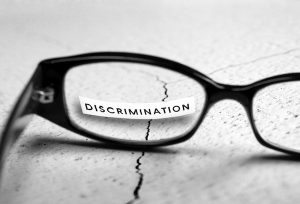 Discrimination in the workplace against employees who belong to certain classes is illegal both under federal and Maryland law. Furthermore, discrimination in the workplace applies to all aspects of the employment relationship, from hiring to termination and everything in between. Unfortunately, some victims think that getting justice for workplace discrimination is too complicated. So they just drop the issue instead of seeking justice. However, you owe it to yourself to find out if you have been illegally discriminated against and what are your rights and options. If you’re feeling discriminated against at work, a Baltimore discrimination lawyer at Smithey Law Group LLC can help you decide if you are a victim of workplace discrimination. In the meantime, we have set out this straightforward guide as a starting point to help understand whether you have suffered from employment discrimination.
Discrimination in the workplace against employees who belong to certain classes is illegal both under federal and Maryland law. Furthermore, discrimination in the workplace applies to all aspects of the employment relationship, from hiring to termination and everything in between. Unfortunately, some victims think that getting justice for workplace discrimination is too complicated. So they just drop the issue instead of seeking justice. However, you owe it to yourself to find out if you have been illegally discriminated against and what are your rights and options. If you’re feeling discriminated against at work, a Baltimore discrimination lawyer at Smithey Law Group LLC can help you decide if you are a victim of workplace discrimination. In the meantime, we have set out this straightforward guide as a starting point to help understand whether you have suffered from employment discrimination.
The Law
As mentioned, both federal and Maryland laws make it illegal for employers to discriminate in the workplace. The most prominent laws making discrimination illegal are:
- Title VII of the Civil Rights Act of 1964—making it illegal to engage in racial discrimination, religious discrimination, or discrimination based on sex or national origin;
- The Pregnancy Discrimination Act of 1978—prohibits employers from denying a job or promotion to an individual based on pregnancy, childbirth, and related medical conditions and prohibits firing or forcing pregnant women to go on leave;
- The Age Discrimination in Employment Act—prohibits employers from engaging in discriminatory conduct or practices against applicants and employees who are 40 and older based on their age;
- The Americans with Disabilities Act—prohibits employers from disability discrimination against qualified applicants and employees; and
- The Maryland Fair Employment Practices Act—prohibits discrimination based on gender identity, marital status, or sexual orientation.
There are other federal and state laws that also prohibit discrimination, and there may be local laws that do the same thing. However, what is important to take away from the above is that you have a right to be free from discrimination in the workplace.
Understanding Discrimination
But what does it mean to discriminate? Discrimination is the unfair or unequal treatment of an individual based on certain characteristics. People with these certain characteristics are said to be in a “protected class” of individuals. Being part of that protected class means employers cannot discriminate based on your:
- Age (40 and over);
- Race or color;
- Religion or creed;
- Ancestry or national origin;
- Sex or gender (including pregnancy, childbirth, breastfeeding, or related medical conditions);
- Sexual orientation;
- Gender identity or gender expression;
- Medical condition;
- Genetic information;
- Marital status;
- Disability (mental and physical); or
- Military or veteran status.
If you feel that your class is not listed, check the DFEH website for more detailed information.
 Discrimination can come in the form of direct or indirect acts. Direct acts are almost always intentional and motivated by bigotry. In addition, similarly situated people treated differently also indicates direct discrimination. While these direct acts have largely been eliminated from the workplace by society and culture, they still occur much too frequently. Examples of direct acts of discrimination include being:
Discrimination can come in the form of direct or indirect acts. Direct acts are almost always intentional and motivated by bigotry. In addition, similarly situated people treated differently also indicates direct discrimination. While these direct acts have largely been eliminated from the workplace by society and culture, they still occur much too frequently. Examples of direct acts of discrimination include being:
- Terminated or forced out;
- Demoted;
- Unjustly and undesirably transferred;
- Hit with a pay or benefits decreases; or
- Passed over for promotion.
This is not a complete list. Any other direct actions that made the conditions or performance of your job harder could also qualify as discrimination. Obviously, slurs, jokes, comments, or mocking behavior directed at a member of a protected class can also rise to the level of direct discrimination. Note, however, that discriminatory intent by the employer is not required to prove discrimination, but in cases of direct discrimination, it’s almost always present. In other words, an employer could participate in direct discrimination by “looking the other way” in the presence of a racist joke.
On the other hand, indirect acts of discrimination usually flow from workplace policies, procedures, and practices. Indirect acts of discrimination are often much more subtle, leaving you wondering if what just happened was discriminatory or not. In fact, policies, procedures, and practices are typically not overtly discriminatory. But certain practices can become discriminatory as applied. For instance, enforcement of a dress code in the workplace may not seem discriminatory on its face. But if it included a prohibition on wearing headdresses, in effect, it could discriminate against an individual in a protected class (i.e., culture, religion, national origin, etc.).
What To Do Next
It can be nerve-racking to think about speaking up if you feel discriminated against. It’s a scary thought, and you may feel worried about what is going to happen if you say anything. First, you should know that Maryland has anti-retaliation laws, which make it illegal for an employer to punish you for reporting a case of possible discrimination. Second, your discrimination report should be confidential. So, once you make the report, you should rest easier knowing that your employer cannot share the information with anyone who does not need to know. That all said, what are the practical steps to take when you believe you have been discriminated against?
Document Everything
After the discriminatory event occurs, record in writing the details of the incident including, dates, times, names of employees and supervisors present, and the nature of the event. Make this record as soon as you can after the incident. We cannot emphasize enough that the more details you include, the better.
Review Internal Policies
Make sure to read and understand your employer’s internal policies and procedures involving how to handle discrimination. These policies and procedures are important because they should tell you who to report the event to and how to file the report. By following your workplace policies and procedures, you can strengthen your case by using the very system designed and approved by your employer.
Give Written Notice
 The internal policies and procedures should tell you who to make your report to within your company. If you don’t have internal policies and procedures, then go to your HR department. If you don’t have an HR department, go to a senior supervisor. Once you identify who to submit your report to, deliver it in writing and keep a copy for yourself. Your report should include:
The internal policies and procedures should tell you who to make your report to within your company. If you don’t have internal policies and procedures, then go to your HR department. If you don’t have an HR department, go to a senior supervisor. Once you identify who to submit your report to, deliver it in writing and keep a copy for yourself. Your report should include:
- Time and place of the discrimination;
- Who discriminated against you;
- What they did and said (be as specific as possible);
- Any witnesses to the discrimination; and
- Any written materials that show discrimination.
The more details you can provide, the better for your report. In addition, make sure to give your employer a chance to address the issue. If they ignore you or do nothing, consider speaking to a Baltimore discrimination attorney.
File A Complaint With The Equal Employment Opportunity Commission (EEOC)
To open the possibility for a private discrimination lawsuit against your employer, you first must file a complaint with the EEOC. When you file a complaint with the EEOC, they will determine if the complaint has merit and if it does, they will investigate the incident. If they find that discrimination did occur, they will try to settle the case with your employer or, in the alternative, file a lawsuit against them. If they choose not to pursue your complaint, they will issue a letter giving you a “right to sue.” Allowing the EEOC to examine your case and come to some conclusion is necessary to retain the right to sue your employer in the future. Filing complaints with the EEOC can be complicated, and they need to be prepared thoroughly and properly to maximize the outcome for your benefit. We suggest you consult with an experienced Baltimore discrimination lawyer to help draft and assemble your EEOC complaint.
Damages For A Discrimination Claim
Because a discrimination claim is a civil lawsuit, the remedy is usually a monetary award. But what makes up that award, and how is it calculated? The following is a list of the types of damage award categories that make up an employment discrimination claim:
- Back pay—based on the difference between what you earned and what you could have earned if you were not a victim of discrimination;
- Future pay—potential earnings in the future had you not been the victim of employment discrimination;
- Lost benefits—lost healthcare insurance, 401K, or other benefits you may have had if you were not the victim of discrimination;
- Emotional distress—compensation for the emotional trauma you suffered due to employment discrimination; and
- Punitive damages—awarded to punish your employer and deter future similar illegal behavior.
There is no formula to calculate damages in an employment discrimination case. But an experienced Baltimore discrimination attorney knows how to calculate a fair award based on the above factors.
Contact Smithey Law Group LLC for A Consultation
The Smithey Law Group LLC has decades of experience representing employees in discrimination cases. Discrimination law is complex and involves tight deadlines, federal and state agencies, and multiple laws. We can help you navigate all of these agencies and laws and maximize your chances for justice and compensation. Our experienced lawyers also handle clients with other types of cases, including sexual harassment and wrongful discharge. Contact us today for a confidential consultation.
